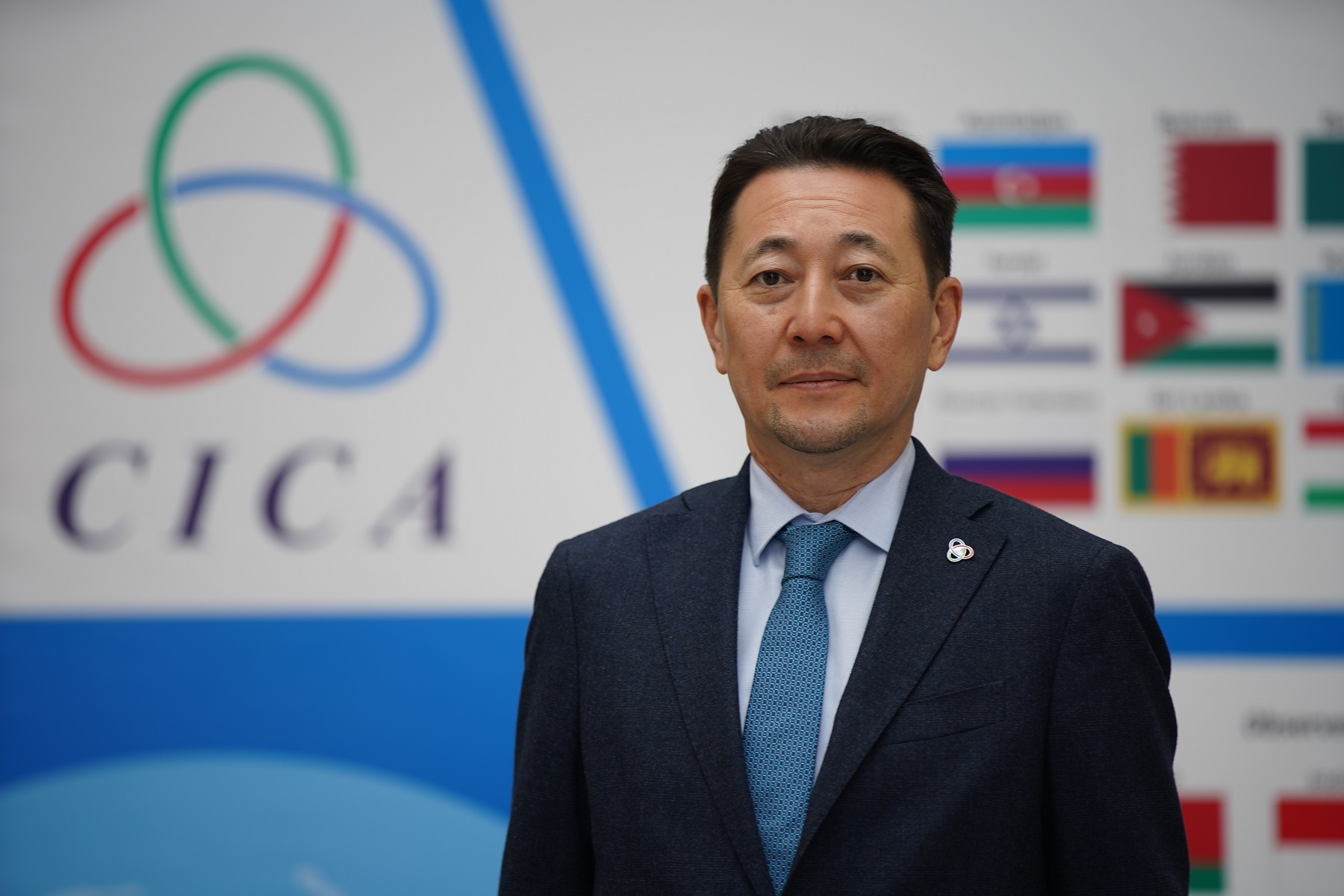ASTANA – The transformation of the Conference on Interaction and Confidence-Building Measures in Asia (CICA) into a full-fledged organization outlines new benchmarks within Kazakhstan’s second two-year chairmanship. New initiatives are aimed at supporting youth and volunteerism, environmental protection, interconnectedness, financing, and combating climate change.

Kairat Sarybay. Photo credit: s-cica.org.
“The strategic goal of the transformation is to enhance the global role of Asia through the structured institutional development of CICA and to strengthen cooperation between member states,” said CICA Secretary General Kairat Sarybay in an interview with the Kazinform news agency.
This year, it is planned to arrange 24 events, including panel sessions, conferences, seminars, and training.
“The CICA, the largest intergovernmental forum in Asia, is the most suitable platform for consolidating the collective wisdom of Asian countries in favor of peace, cooperation, development, and security, as well as for their full inclusion in the global security architecture and multilateral decision-making processes,” said Sarybay.
The ongoing activities are carried out in accordance with the decisions of the sixth CICA summit held in October 2022, the initiatives of Kazakh President Kassym-Jomart Tokayev, and objectives presented at the meeting of the CICA Ministerial Council in September last year.
Transformation of CICA into a full-fledged regional international organization
The sixth CICA summit wrapped up with the approval of the Astana Statement, the first milestone document to have launched the transformation of the forum. It also extended Kazakhstan’s chairmanship for 2022-2024.
“This historic decision was preceded by extensive consultations among member states, which recognized that the forum successfully serves as an effective multilateral mechanism for interaction, confidence-building, and cooperation,” he said.
Apart from the Astana Statement, the head of the multinational forum mentioned the importance of a roadmap for the step-by-step transformation of the CICA. It was adopted during the meeting of the CICA Ministerial Council on the sidelines of the 78th session of the United Nations General Assembly (UNGA) in New York.
Sarybay added that over three decades, the CICA has acquired the status, role, structure, functions, working methods, and other properties of a full-fledged international organization.
“Currently, we are discussing such topics as the development of the charter of the organization, improving the implementation of confidence-building measures and working out promising priority areas of cooperation, as well as the international status of the staff of the CICA Secretariat,” said Sarybay.
“Besides, we will address the role and functions of the Secretary General and the Secretariat, the budget reform, and human resources management,” he added.
Plans for 2024 within Kazakhstan’s chairmanship in the CICA
Amid escalating geopolitical challenges, Kazakhstan’s chairmanship aims to consolidate the efforts of 28 member states in strengthening peace, security, and stability in Asia.
“Kazakhstan calls on all members of our organization to make the best use of the CICA to overcome differences through an open and constructive dialogue with an emphasis on what unites us, rather than what separates us,” said Sarybay.
“The CICA uses a unique Asian approach by focusing on what connects nations through political, economic, historical and cultural diversity, which is our heritage,” he noted.
Kazakhstan also chairs the CICA Business Council, an advisory body consisting of representatives of small and medium-sized enterprises (SMEs) and government agencies of member countries.
“In October 2023, Astana hosted a meeting of the Business Council with the participation of 160 experts and representatives of SMEs. Discussions focused on green finance, food security, and renewable energy sources. The Business Council set its agenda for 2024, which reflects the pressing challenges faced by SMEs not only in Asia but worldwide, with a special focus on empowering women in entrepreneurship,” said Sarybay.
At Kazakhstan’s initiative, the CICA created a new confidence-building measure – epidemiological safety, public health and pharmaceuticals. As for the military-political dimension, which is another key focus of the chairmanship, Kazakhstan holds annual seminars on security, conflict prevention, de-escalation, and expansion of cooperation between member states.
The far-reaching implications of climate change and water risks in Central Asia highlight the growing need for collective efforts in resolving global problems, and hence the importance of high-level and expert discussions on environmental governance.
On Aug. 28, the Kazakh Ministry of Ecology and Natural Resources, the Kazakh Foreign Ministry, and the CICA Secretariat plan to hold a ministerial conference on environmental issues in Astana.
“This event will be the starting point for systematic and long-term work to address the pressing climate problems that Asia is facing today,” said Sarybay.
Volunteerism has emerged as an important part of the CICA agenda given the opportunities it provides to address critical needs and promote civic engagement. In September last year, the CICA Ministerial Council adopted a statement on promoting volunteerism for sustainable development.
On May 16-17, the Kazakh capital will host the rally of leaders of the CICA volunteer movements under the auspices of the Youth Council. The initiative of President Tokayev will allow young leaders to share ideas and best practices in volunteering and civic participation.
Sarybay emphasized that “supporting and encouraging the active involvement of citizens in volunteer activities is a completely new area for the CICA activities.”
Kazakhstan is also focused on creating a partner network of leading universities of the CICA member states.
“This mechanism aims to facilitate academic exchanges, joint research projects, and cooperation programs between Asian universities for the benefit of education systems and youth communities across the continent,” said Sarybay.
Given new global economic challenges, such as supply chain disruptions, the CICA established the Council on Sustainable Connectivity. According to Sarybay, this decision should “stimulate the development of transit potential of member states and strengthen sustainable transport corridors throughout the Asian continent.”
This year, apart from CICA, Kazakhstan chairs another five international organizations – the Shanghai Cooperation Organization (SCO), the Organization of Turkic States (OTS), the Collective Security Treaty Organization (CSTO), the Islamic Organization for Food Security (IOFS), and the International Fund for Saving the Aral Sea (IFAS).
